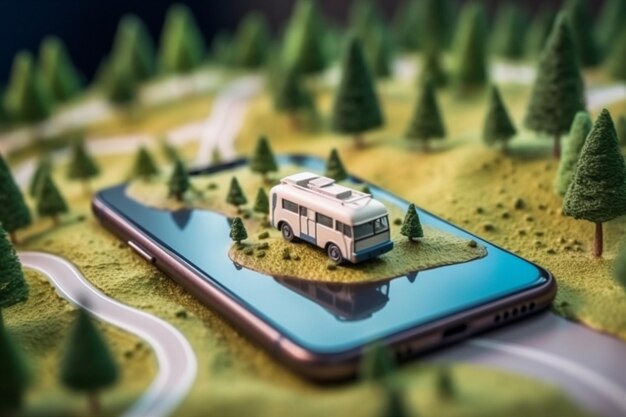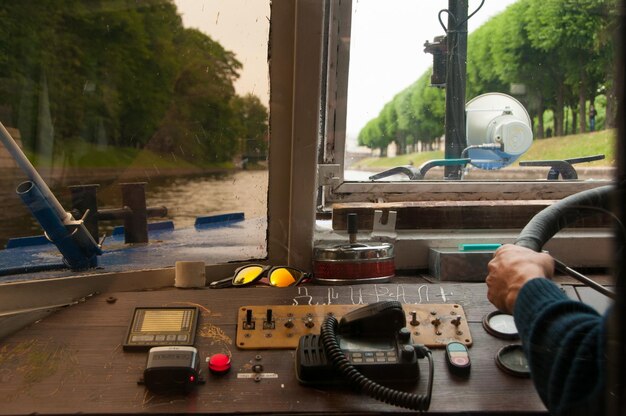Quick Read
My First Year Living Off-Grid: The Ups and Downs
Living off-grid, or being completely disconnected from the main power grid, has been an
curiosity
and
determination
. The initial transition was filled with
excitement
as I set up my solar panels, installed a rainwater collection system, and began to rely on alternative sources of energy.
However, the first few months were also fraught with
frustrations
. I grappled with the intricacies of managing my power usage, learning to conserve energy during peak sunlight hours and adjusting to the intermittency of solar power. Adapting to this new way of life took time, but I quickly discovered that the rewards far outweighed the initial challenges.
One of the most
rewarding
aspects of living off-grid has been the
connection to nature
. Waking up each day to the sounds of birds chirping and the sun rising over the horizon has become a daily reminder of the beauty and simplicity of the world around me. Moreover, I’ve come to appreciate the
resourcefulness
that this lifestyle demands – from preserving food through canning and dehydration, to building furniture from reclaimed wood.
The
community
of off-grid enthusiasts has also been a source of immense support and inspiration. I’ve learned invaluable lessons from others who have shared their experiences, struggles, and triumphs. Being part of this community has fostered a sense of belonging and camaraderie that goes beyond geographical boundaries.
Despite the initial obstacles, I can confidently say that my first year living off-grid has been a transformative experience. It’s taught me to be more mindful of my consumption, appreciate the simple things in life, and connect with nature and my community in a deeper way.

Living Off-Grid: A Journey Towards Self-Sufficiency and Independence
Living off-grid is a lifestyle choice that involves living in a self-sufficient manner, disconnected from the traditional public utility infrastructure. This means that those who live off-grid do not rely on the grid for their essential needs such as electricity, water, and sewage. Instead, they generate their own power through renewable sources like solar or wind, collect rainwater for drinking and household use, and manage their waste in decentralized systems.
Personal Background and Motivation
Motivations for making the shift towards off-grid living can vary greatly from person to person. For many, it’s a desire to simplify their lives and reduce their impact on the environment. Others seek greater independence from societal norms and institutions, or a deeper connection to nature. Still, others are driven by financial considerations, as living off-grid can significantly reduce utility bills.
Previous Living Situation: Urban or Suburban
Before embarking on this journey, most off-grid dwellers have spent some time in the urban or suburban setting. They’ve experienced the hustle and bustle of city life, or the predictability and routine of suburban living. However, they soon come to realize that these environments don’t fully satisfy their desire for self-sufficiency and a closer connection to nature.

Planning and Preparation
Choosing a Location
- Climate: Consider the average temperature, precipitation, and wind patterns to ensure a suitable living environment.
- Topography: Evaluate the terrain for ease of access, potential risks (landslides, floods), and opportunities for natural resources.
- Proximity to Resources: Determine the availability of water sources, wood for heating and construction, and other necessary materials.
Building a House or Acquiring One
Options:
- Building from Scratch: Custom-design your home to fit the location and your specific needs.
- Buying an Existing Off-Grid Home: Look for a house that already has the necessary systems in place.
- Converting an RV or Trailer: Modify a mobile unit to meet your off-grid living requirements.
Installing Necessary Systems
Electricity:
- Solar Panels: Collect electricity from sunlight.
- Batteries: Store excess energy for use during cloudy days or at night.
- Inverter: Convert DC power to AC for use in the home.
- Charging Controller: Regulate the charging process of batteries from solar panels.
Water:
- Rainwater Collection System: Harvest rainwater for household use.
- Well or Spring: Drill a well or tap into a natural spring for a constant water source.
Heating and Cooling:
- Wood Stove: Provide heat during the colder months.
- Passive Solar Design: Design your home to maximize solar heating.
- Insulation: Use adequate insulation to maintain a comfortable temperature.
Sanitation:
- Composting Toilet: Convert waste into fertilizer.
- Outhouse: Build a simple outhouse for toilet use.
- Septic System: Install a system to handle wastewater treatment and disposal.
Budget and Financial Considerations
Costs of Building or Buying a Home Off-Grid versus On-Grid: Determine the initial investment and ongoing expenses for each option.
Ongoing Expenses:
- Maintenance: Regularly maintain systems and structures to keep them functioning.
- Repairs: Address any issues as they arise.
- Replacement Parts: Replace worn-out parts to keep systems running smoothly.
E. Legal and Regulatory Issues
Building Permits, Zoning Laws, and Property Rights: Ensure compliance with local regulations and secure property rights.
Connecting to the Grid for Emergencies or Selling Excess Energy:
- Evaluate the possibility of connecting to the grid for emergencies or selling excess energy generated from solar panels.
Obtaining Necessary Certifications or Licenses (if Applicable):
Secure any necessary certifications or licenses to operate off-grid systems and adhere to environmental regulations.

I The Transition: Challenges
Moving Day: Logistics and Challenges
The moving day is an intricate process in the transition to an off-grid lifestyle. Transporting belongings to the new location requires careful planning and resources. Consider renting a moving truck or hiring movers for larger items. For smaller belongings, opt for reusable bins to minimize disposables and reduce the environmental impact.
Transporting Belongings
Setting up temporary living quarters is essential during the transition. Depending on your off-grid choice, this may include an RV, a tent, or other alternatives. Ensure you have essential amenities, such as water, electricity, and heat, before moving in.
Temporary Living Quarters
Adjusting to a New Lifestyle
Learning new skills
- Gardening: Learn to grow your food through techniques such as companion planting, permaculture, and organic gardening.
- Woodworking: Construct essential structures for your off-grid home with basic carpentry skills and tools.
- Maintenance: Keep your property in good condition through regular upkeep and repairs.
Coping with isolation and limited access to amenities
- Connect with your community through workshops, events, or volunteering.
- Find solace in hobbies, such as reading, writing, painting, or music.
Building a social network
- Engage in local off-grid communities and meet like-minded individuals.
- Join online forums, blogs, or social media groups to share knowledge and experiences.
Overcoming Challenges and Setbacks
Dealing with unexpected repairs or system failures
- Keep a well-stocked toolkit for quick fixes and have backup systems in place.
- Consult online resources, manuals, or consult with experts when necessary.
Coping with extreme weather conditions
- Prepare for the elements by insulating your living quarters, having backup heating sources, and creating windbreaks or sunshades.
- Stay informed about weather patterns in your area and adjust your routines accordingly.
Balancing work and homesteading responsibilities
- Create a schedule to manage both work and off-grid living tasks.
- Consider delegating tasks or seeking help from family, friends, or community members.
Finding Sources of Income (if Applicable)
Off-grid living can provide unique opportunities for generating income. Farming and gardening
- Sell excess produce to local markets or directly to consumers.
- Create value-added products, such as jams, pickles, or crafts, for sale.
Remote work or freelance opportunities
- Consider your skills and experience to determine if working remotely is an option.
- Market your services online or connect with potential clients locally.
Creating a bed and breakfast or hosting tourists
- Offer guests a unique experience by providing lodging, meals, and activities related to off-grid living.
- Advertise your bed and breakfast on travel websites or through word of mouth.
The Benefits and Rewards of living an off-grid lifestyle are numerous and rewarding.
Improved health and wellbeing
- Fresh air, sunlight, and access to nature are essential elements of off-grid living. Studies have shown that fresh air and sunlight improve both physical and mental health.
- Reduced stress
and increased self-sufficiency are also benefits of off-grid living. The peaceful, quiet environment and the sense of accomplishment that comes from producing one’s own food and energy can lead to a significant reduction in stress levels.
Financial savings
- Lower utility bills
are a major financial benefit of off-grid living. With the use of renewable energy sources such as solar panels and wind turbines, homeowners can significantly reduce their electricity bills.
is another financial advantage. Off-grid living allows individuals to produce their own food, water, and energy, reducing the need for store-bought goods.
Building a community and sense of belonging
- Connecting with like-minded individuals
who share similar values and goals is an important aspect of off-grid living. Sharing knowledge, skills, and resources within the community can lead to a strong sense of camaraderie and support.
is a mutual exchange that helps to strengthen the bonds of the community.
Personal growth and fulfillment
- Developing new skills and hobbies
is a natural outcome of off-grid living. From gardening to woodworking, there are countless opportunities to learn new skills that can lead to personal growth and fulfillment.
is a core principle of off-grid living. Building a self-sufficient lifestyle that aligns with personal values and beliefs can lead to a deep sense of connection with the natural world.
that aligns with personal values and beliefs is a rewarding experience. The sense of accomplishment and independence that comes from producing one’s own food, water, and energy can lead to a high level of personal fulfillment.

Conclusion
Reflections on the First Year of Living Off-Grid
The first year of living off-grid has been a rollercoaster ride filled with successes, challenges, and lessons learned. We’ve mastered the art of harvesting rainwater for our daily needs, installed solar panels to generate electricity, and constructed a composting toilet. However, we’ve also encountered setbacks such as unexpected power outages during harsh weather conditions and the constant challenge of sourcing locally grown produce in our remote location. These experiences have taught us valuable lessons about resourcefulness, adaptability, and resilience.
Successes
We’ve successfully established a sustainable food garden that provides us with a steady supply of fresh fruits and vegetables. Our renewable energy systems have allowed us to live comfortably without relying on the grid, and we’ve even managed to sell excess energy back to the utility company.
Challenges
Our biggest challenge has been learning to live with limited resources and adapting to the unpredictable weather patterns. However, we’ve discovered that these challenges have only made our off-grid lifestyle more rewarding and fulfilling.
Lessons Learned
Throughout the past year, we’ve learned the importance of community and collaboration. We’ve formed bonds with our neighbors who also live off-grid and have shared resources and knowledge to help each other overcome challenges. We’ve also come to appreciate the simple things in life, such as watching the sunrise over the mountains or listening to the sounds of nature.
Future Plans and Goals for Continued Self-Sufficiency
As we look to the future, our goals are to continue expanding our self-sufficient lifestyle. We plan to build a greenhouse for year-round vegetable production, invest in a rainwater harvesting system that can store enough water for our entire household, and explore alternative sources of income such as selling excess produce to local restaurants or offering workshops on sustainable living.
Encouragement and Inspiration for Others Considering the Off-Grid Lifestyle
For those considering the off-grid lifestyle, we encourage you to take the leap of faith. It may be challenging at first, but the rewards are immeasurable. You’ll gain a deeper appreciation for nature and the simple things in life, and you’ll join a community of like-minded individuals who are committed to living sustainably.
Closing Thoughts and Resources for Further Reading or Research
In closing, living off-grid has been an incredible journey of self-discovery and growth. We’ve learned to embrace the challenges and savor the successes, and we look forward to continuing our self-sufficient lifestyle for many years to come. For those interested in learning more about off-grid living, we recommend checking out the following resources:




